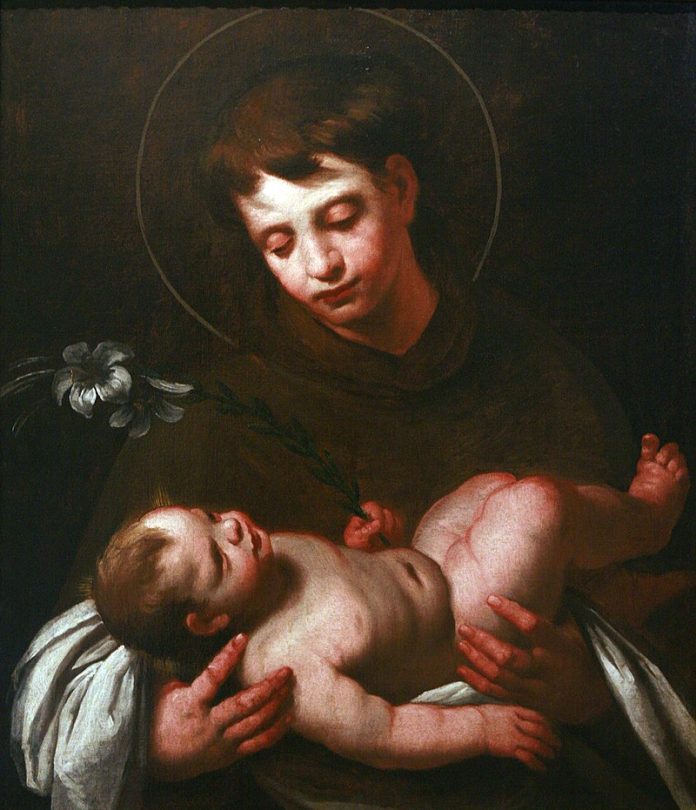
Saint Anthony of Padua is usually named historically after the city-state in northeastern Italy where he died after his brief but full life at the age of 35 in 1231. But he is also claimed by the Portugese, who call him Anthony of Lisbon, where he was born in 1195, as Fernando Martins. There has been quite a centuries-long struggle over who ‘owns’ the saint more. Does one belong to one’s birthplace and where one was raised, or to the region where one lived and worked in one’s mature years?
This is also the day that Our Lady appeared a second time to the three seers of Fatima in 1917, about 70 miles or so from where Anthony was born, and just as the message of Fatima has gone far beyond the Iberian village where the three children saw the angel and Our Lady, so too in his own lifetime, and more so after his death and glory in heaven, has the fame and renown of Saint Anthony spread throughout the world. God exalts the humble, to humble the proud.
In his youth, he joined the local Augustinian monastery, and life was good in the daily rhythm of the rule. But after hearing of the martyrdom of a new group of radical friars on a mission to convert the Muslims in northern Africa, he transferred to the so-called ‘Franciscans’, named after their even-more radical founder, and took the name Anthony.
As was his desire, Anthony received permission also to set sail across the Mediterranean to try also converting the Islamic followers of the ‘Prophet’ to the Way of Christ, but he fell sick, and as the ship was returning to Portugal, was providentially blown off course and landed in Sicily. Thus beginning the Italian chapter of the Portuguese Anthony’s life.
For it was soon afterward this disembarkation that, at an ordination at Firoli in 1222, there was no preacher to be had, so young Anthony was asked to fill in at the last minute. With nothing prepared, he just said ‘whatever the Holy Spirit put into his mouth’. Well, he amazed them all with his sermon…his eloquence, his knowledge of Scripture, his holiness, the whole logos, ethos and pathos of superlative public speaking, elevated supernaturally.
Thus began the brief apostolate of Saint Anthony, as he preached missions up and down Italy, with allegories and similes in interpreting Scripture that seemed themselves inspired. His words converted untold numbers either to the Faith, or to deeper holiness. But he was also ‘modern’, advocating that the the Church must speak to the men of her day, and not dawdle in a mythical ‘simple’ past, whether of the Protestant or traditionalist sort. As he put it:
Men will surrender to the spirit of the age. They will say that if they had lived in our day, faith would be simple and easy. But in their day, they will say, things are complex; the Church must be brought up to date and made meaningful to the day’s problems.
To this day, Anthony was and is known as one of the most gifted preachers who ever lived. As a testament to his eloquence, God has miraculously kept his tongue incorrupt. (Our Faith is nothing if not incarnational). Anthony was also quite learned – Saint Francis himself recognized in the young disciple a kindred spirit, and in 1224 entrusted the supervision of the studies of the Friars to Anthony.
He is also the patron saint of ‘lost’ things, for the story is told that a novice decided to leave, and took Anthony’s precious book of psalms with him – which would have been nearly impossible to replace. Anthony prayed, and the thief, struck by repentance, returned the lost psalms. Ever since, there are innumerable testaments to his ability to find objects that, prescinding from such supernatural agency, may have remained hidden until that final judgement, when all things will be revealed.
We may even spiritualize such ‘lost things’, asking Saint Anthony to help us find our lost patience, equanimity, or cheerfulness, or lost relationships, friendships, or if we ourselves feel just, well, lost. There is just something about this saint that lives through the ages, his sanctity and humility widely recognized during his own life. He was beatified and canonized by Pope Gregory IX on the same day, May 30, 1232, less than a year after his death, one of the most speedily canonized saints in history, and certainly one of the most popular, with his statue adorning most Catholic churches – subito et universo santo! Seven hundred years later, Pope Pius XII declared him a doctor of the Church due to the eloquence of his preaching, on January 16, 1946. He is now exalted by the Most High God, with the Blessed Virgin and all the saints.
Our Lady of Fatima and Saint Anthony of Lisbon and Portugal, orate pro nobis!
